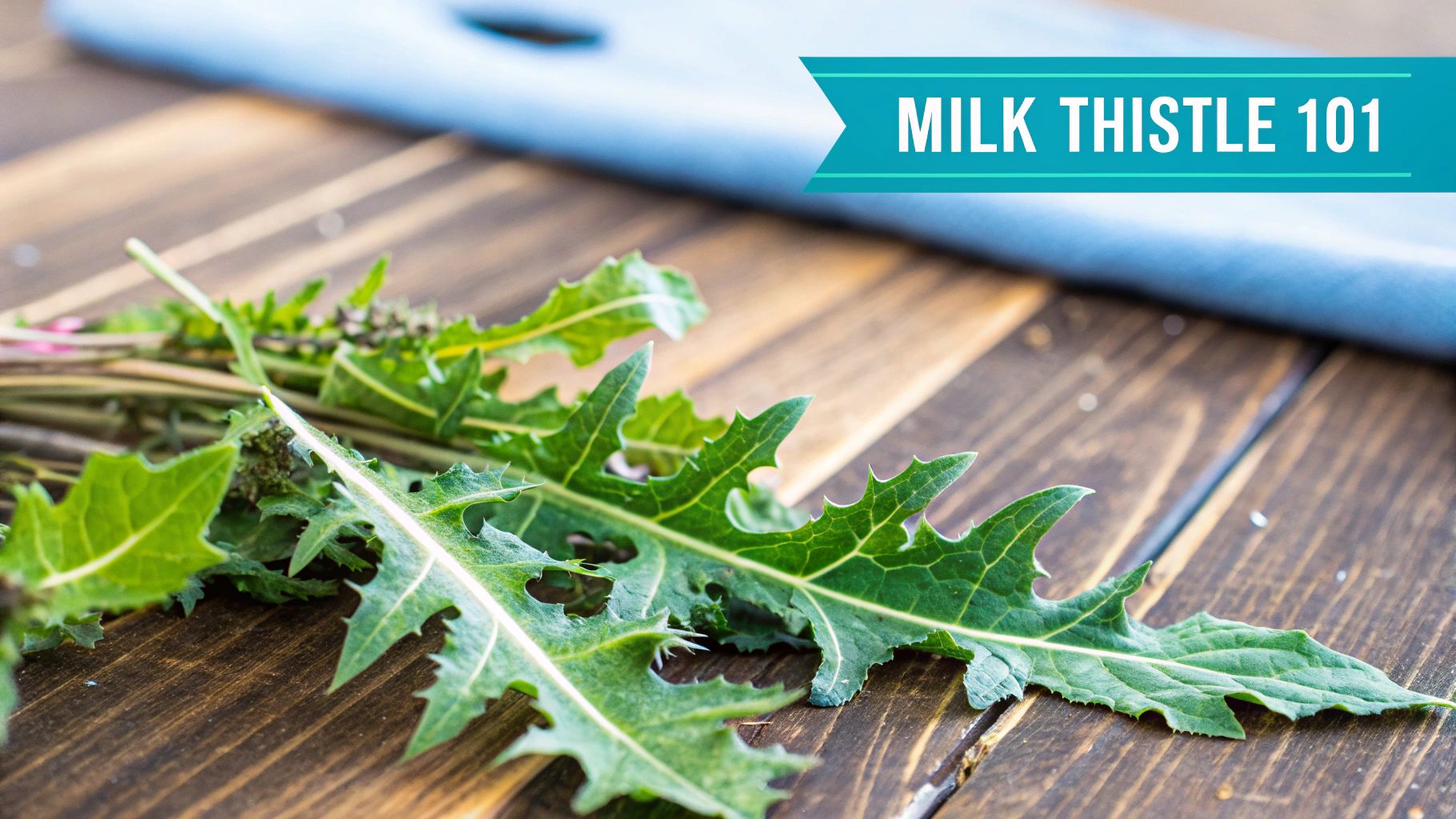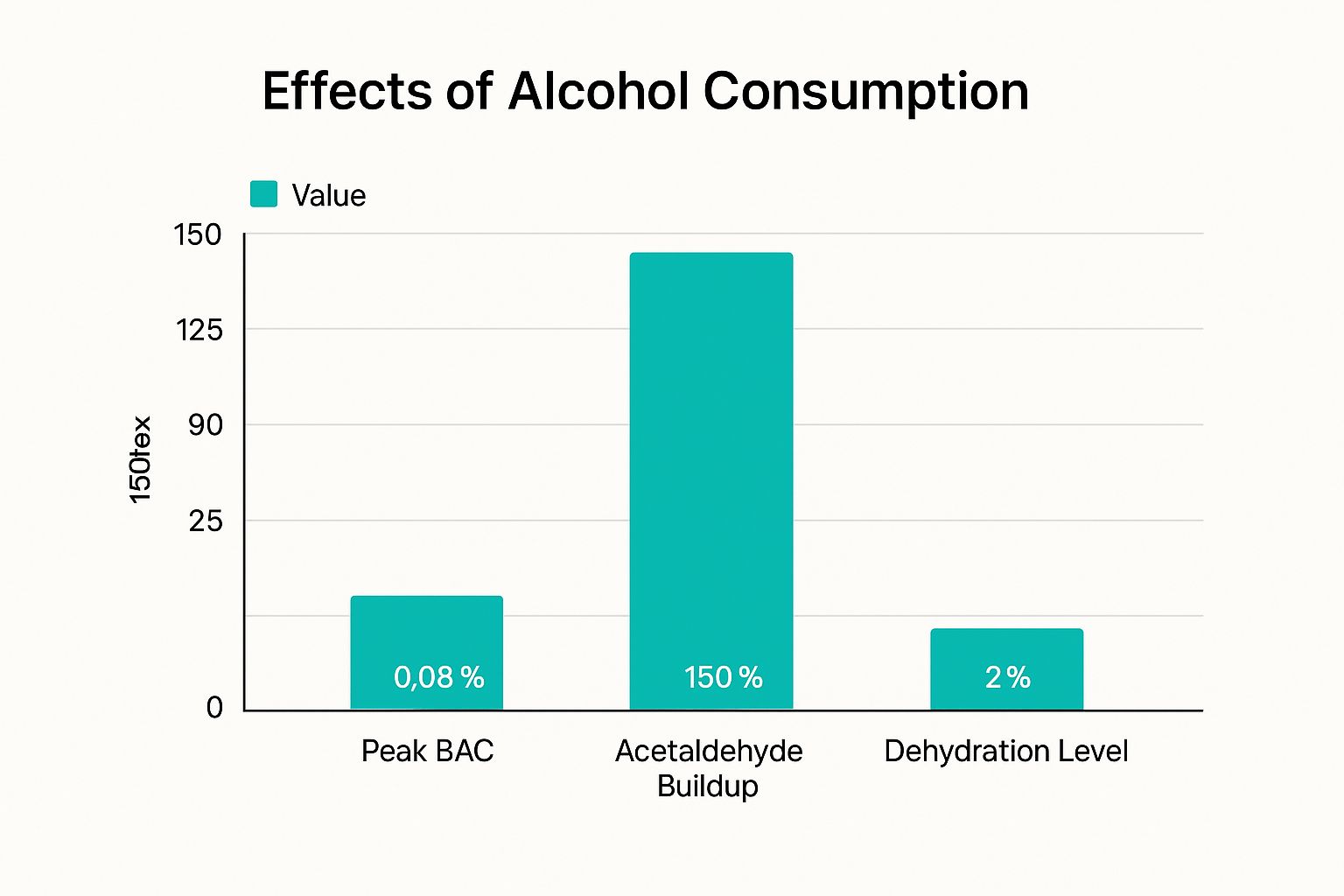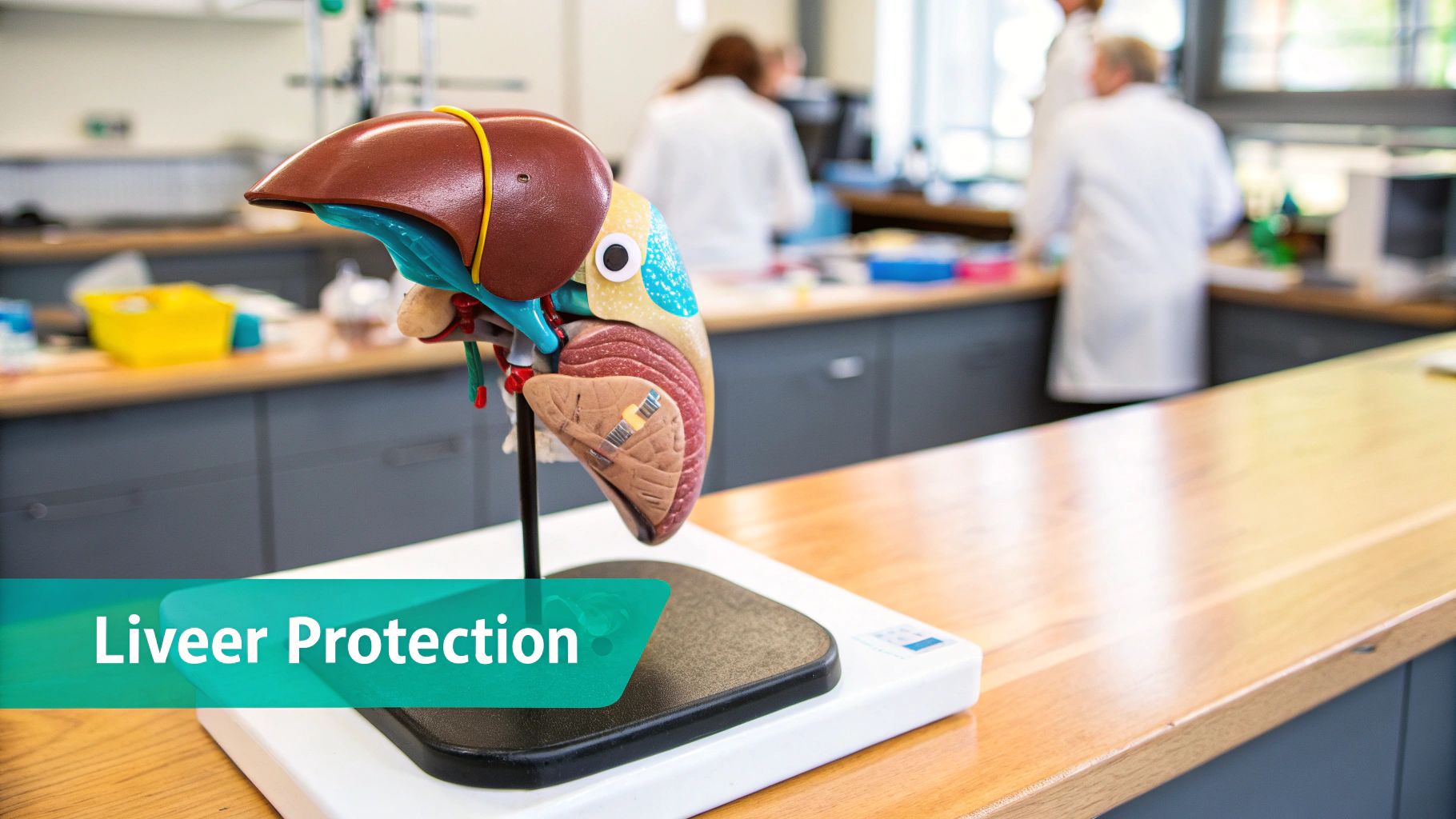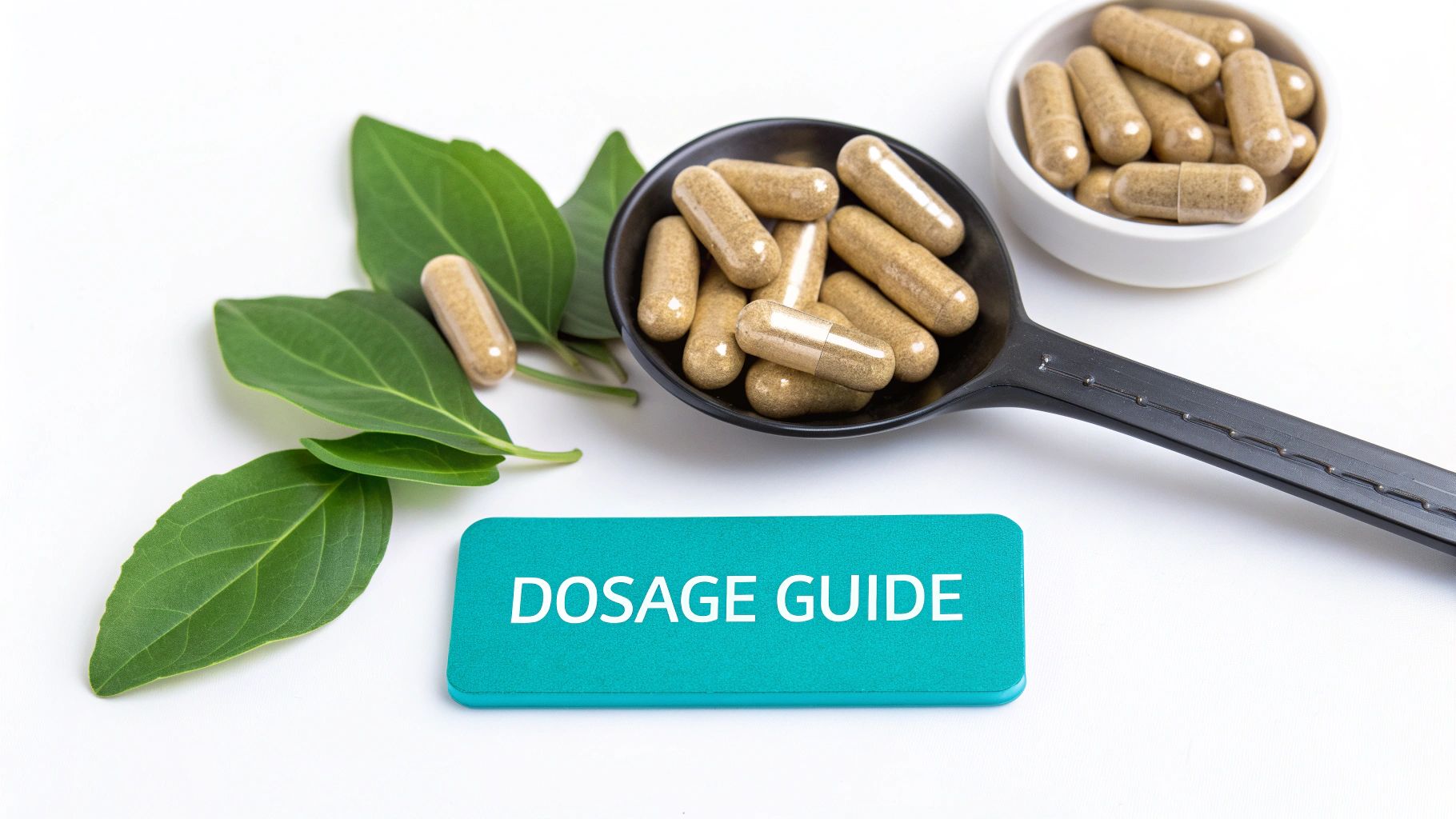

· By Annemarie
Does Milk Thistle Help Hangovers? Find Out Now
The Rise of Milk Thistle as a Hangover Solution

From ancient remedies to modern wellness trends, milk thistle has long been used in traditional medicine. This prickly purple flower, known scientifically as Silybum marianum, has recently gained popularity as a potential hangover cure. But what's driving this renewed interest? It’s a blend of historical context, the growing appeal of natural solutions, and effective marketing. This leads us to a crucial question: does milk thistle actually work for hangovers?
The Appeal of Silymarin
The potential benefits of milk thistle are often attributed to silymarin, its active compound. Silymarin is thought to possess antioxidant and anti-inflammatory properties. These properties could theoretically support liver function. Because the liver plays a vital role in processing alcohol, the idea of bolstering its function to reduce hangover symptoms is attractive. This possible mechanism of action has fueled interest in milk thistle as a morning-after aid.
Market Trends and Consumer Demand
The wellness sector has experienced a surge in demand for natural remedies. Milk thistle has benefited from this trend. By the late 2010s, the global market for milk thistle supplements exceeded $120 million USD annually. This growth shows a rising number of individuals seeking plant-based options for various health issues, hangovers included. However, market success doesn't guarantee effectiveness.
The Disconnect Between Belief and Evidence
While anecdotal reports and traditional uses are plentiful, scientific support for milk thistle as a hangover cure remains limited. Milk thistle (Silybum marianum) has been researched for liver-protective qualities, but no clinical trials have demonstrated its efficacy in specifically treating or preventing hangovers. Market data shows global sales exceeding $120 million USD annually by the late 2010s, with substantial presence in North America, Europe, and Asia. Yet, despite its popularity and some small or animal studies hinting at potential liver health benefits, human trials on hangover symptom relief are lacking.
For instance, a 2020 Healthline review noted that while silymarin may offer benefits for certain liver conditions – a claim supported by a few studies – randomized, controlled trials on hangover severity are absent. This discrepancy is especially noticeable in countries with high alcohol consumption like Germany and the UK, where hangover remedies are in high demand, but reliable evidence is still scarce. Learn more about milk thistle and hangovers here.
This raises important questions about the supplement's continued popularity. The following sections will explore the scientific evidence, examining the difference between consumer perceptions and research results. Our goal is to provide a clearer understanding of milk thistle's true potential for hangover relief. Is it a genuine cure, or simply a cleverly marketed misconception?
Examining the Evidence: What Research Actually Shows

This infographic highlights the main culprits behind that dreaded morning-after feeling: peak Blood Alcohol Content (BAC), acetaldehyde buildup, and dehydration. Acetaldehyde, a toxic byproduct of alcohol metabolism, and dehydration play significant roles in the overall hangover experience. This leads us to the question: does milk thistle offer any real relief? For a deeper dive into hangover causes, check out this helpful article: What Causes Hangovers?
Separating Hype from Reality
Milk thistle, and more specifically its active component silymarin, has gained attention for its potential liver-supporting properties. However, its effectiveness in easing hangover symptoms lacks solid scientific evidence. This gap between popular belief and research warrants a closer look.
The Challenge of Hangover Research
Studying hangovers is inherently complex. Researchers face several challenges, including individual differences in how people process alcohol, the subjective nature of hangover symptoms, and the difficulty of recreating real-world drinking habits in a lab setting. For instance, one person's "mild" hangover might be another's all-out misery.
Moreover, most milk thistle studies focus on chronic liver conditions, not the acute effects of a hangover. This makes it hard to draw conclusions about its hangover-fighting potential based on existing research. Benefits observed in liver health studies don't automatically translate to hangover relief.
The Lack of Clinical Evidence for Hangover Remedies
A 2021 review of 82 different hangover products, including milk thistle, revealed a surprising finding: not one had sufficient peer-reviewed human studies to demonstrate its safety or efficacy. Find more detailed statistics here. This underscores the significant disconnect between the market for hangover remedies and the evidence supporting them.
Let's take a closer look at the available evidence for several common hangover remedies, including milk thistle:
To help visualize this, here’s a helpful table:
Scientific Evidence for Popular Hangover Remedies
This table compares the level of scientific evidence for several popular hangover remedies, including milk thistle.
| Hangover Remedy | Theoretical Mechanism | Clinical Evidence | Expert Recommendation |
|---|---|---|---|
| Milk Thistle | Liver support, antioxidant properties | Limited, mostly preclinical | Not currently recommended specifically for hangovers |
| Electrolyte Drinks | Replenish lost fluids and electrolytes | Some evidence for dehydration relief | Can be helpful for rehydration |
| Pain Relievers (NSAIDs) | Reduce inflammation and pain | Can alleviate some symptoms, but use with caution | Use sparingly, avoid if liver problems exist |
| Rest and Hydration | Allows the body to process alcohol and recover | Generally recommended | Crucial for recovery |
As this table demonstrates, while some remedies might offer relief from certain symptoms, like dehydration, none have strong scientific backing for comprehensive hangover cure.
Expert Opinions and Current Consensus
Even experts who recognize milk thistle's potential liver benefits hesitate to endorse it specifically for hangovers. This caution is due to the absence of large-scale human trials focused on this specific use. While small studies, often on animals, have shown some promise, applying these results to humans experiencing hangovers requires more research. The current consensus? More high-quality human studies are needed to determine milk thistle’s true impact on hangovers. This doesn't necessarily mean it's ineffective, but its role remains uncertain.
Why We Keep Taking Unproven Hangover Remedies

The morning after a night out can be rough. That familiar hangover feeling often sends us searching for a quick fix, sometimes leading us to remedies with little scientific support. Why do we so readily embrace these unproven solutions, like milk thistle for hangovers? The answer involves a mix of psychology, marketing, and cultural influences.
The Placebo Effect and the Power of Hope
The placebo effect plays a significant role. When we believe a remedy will work, our bodies can sometimes respond positively, even if the remedy itself is ineffective. This psychological response is especially strong when we're desperate for relief, as is often the case with a hangover. Simply the act of taking something can bring comfort and a sense of control.
Testimonials and the Illusion of Proof
Testimonials also exert a powerful influence. We see positive reviews or hear anecdotal stories about miracle cures, and these narratives, while compelling, aren't scientific evidence. They tap into our desire for a quick solution and can easily sway our decisions.
Surveys show a surprising number of people use remedies like milk thistle for hangovers, despite the lack of scientific evidence. Approximately 1 in 10 U.S. adults and 15% of regular drinkers in some European countries report using such supplements. However, clinical trials on milk thistle specifically for hangovers are scarce or nonexistent. Explore this topic further. This continued use shows a strong consumer demand and a willingness to try unproven options, especially in areas with booming supplement markets and less strict marketing rules.
Marketing Strategies and the Creation of Belief
Clever marketing strategies also contribute to the issue. Companies use persuasive language and emphasize traditional uses to create an illusion of authority around their products. This can lead consumers to believe a product is more effective than it is, particularly with something as subjective as a hangover.
Cultural Influences and the Appeal of Natural Remedies
Cultural views on natural supplements also play a part. In some cultures, there's a strong belief in the power of natural remedies, leading to higher usage rates regardless of scientific backing. This cultural context can reinforce the perceived effectiveness of these remedies.
Hangover Vulnerability and Our Need for Relief
Finally, it's important to recognize how vulnerable we feel when we're unwell. A hangover can make us desperate for anything to ease the discomfort. This desperation makes us more open to suggestions and marketing claims, even if they lack scientific support. It highlights our complicated relationship with alcohol and our ongoing quest for wellness. While milk thistle may not be the answer, the desire for a hangover cure persists, driving us to explore various remedies.
The Liver Connection: Where Milk Thistle Actually Shines
While a quick fix for that pounding headache might be top of mind, the real benefit of milk thistle lies in its potential for long-term liver health. This isn't about masking hangover symptoms; it's about supporting the organ that processes alcohol. Milk thistle's role isn't as a hangover cure, but potentially as a liver support supplement.
Understanding Silymarin’s Role
The active compound in milk thistle, silymarin, is a potent antioxidant and anti-inflammatory agent. Think of it as a shield for your liver cells, protecting them from damage caused by toxins, including alcohol. Silymarin may even stimulate the regeneration of liver cells, further supporting this vital organ’s function. This regenerative potential is why milk thistle is often discussed regarding chronic liver conditions.
Beyond Hangovers: Milk Thistle’s True Potential
The liver's role extends far beyond processing alcohol. It filters environmental toxins, metabolizes medications, and plays a crucial role in overall health. Supporting liver health is beneficial even beyond the scope of hangovers. You might be interested in: How to master liver support with milk thistle. Milk thistle, through its liver-supporting properties, might contribute to overall wellness.
Dosing, Interactions, and Who Benefits
While generally considered safe, understanding appropriate milk thistle dosing is crucial. Typical doses range from 175-800 mg of silymarin daily, often divided into several doses. Consulting a healthcare professional before starting any new supplement is essential, especially if you're taking other medications. Milk thistle can interact with certain drugs. This is especially important for those with pre-existing liver conditions or taking prescription medications metabolized by the liver.
Liver Support vs. Hangover Relief: An Important Distinction
While milk thistle may offer some general liver support, it's crucial to differentiate this from targeted hangover relief. Currently, there's no conclusive scientific evidence that milk thistle directly alleviates hangover symptoms. This distinction is critical for managing expectations. If you're seeking immediate hangover relief, strategies like hydration and rest are more effective.
The following table summarizes the potential benefits and limitations of milk thistle, particularly regarding hangover relief:
Milk Thistle: Potential Benefits vs. Limitations
| Aspect | Potential Benefits | Limitations | Level of Evidence |
|---|---|---|---|
| Liver Health | Antioxidant and anti-inflammatory effects, potential cell regeneration | Not a cure for liver disease | Moderate evidence for certain conditions |
| Hangover Relief | No direct evidence for symptom reduction | May offer some general liver support | Limited to no evidence |
| Safety | Generally safe for most people | Potential drug interactions | Consult a healthcare professional before use |
Milk thistle's potential lies in its ability to support liver health, indirectly contributing to overall wellness. Understanding this empowers informed decisions about its use and clarifies the difference between liver support and a hangover cure.
Better Ways to Prevent and Treat Hangovers

So, if milk thistle isn't the magic cure, what actually works for hangovers? This section explores evidence-based strategies to truly lessen hangover severity and duration. Instead of quick fixes, let's focus on supporting your body's natural recovery.
Hydration is Key
Dehydration significantly contributes to hangover symptoms. Alcohol is a diuretic, increasing urination and leading to fluid and electrolyte loss. Drinking water throughout the night is good, but consistent hydration before, during, and after alcohol consumption is best. This maintains a healthy fluid balance, minimizing alcohol's dehydrating effects.
Food as Fuel
Eating before and during drinking significantly impacts alcohol processing. Food slows alcohol absorption, preventing rapid blood alcohol content spikes. Foods rich in complex carbohydrates and protein provide sustained energy and support metabolic processes.
The Importance of Sleep
Quality sleep is essential for recovery from almost anything, including hangovers. Alcohol disrupts sleep, even with a full night's rest. Prioritizing sleep after drinking allows your body to repair and recover efficiently. Aim for uninterrupted, restorative sleep to minimize fatigue and irritability, common hangover symptoms.
Supplement Considerations
Milk thistle is often considered a supplement. You can read more about general gut health supplements. While some supplements might help with specific recovery aspects, like electrolyte replenishment, none definitively cure hangovers. Consult a healthcare professional before using supplements, especially with underlying health conditions.
Pacing and Moderation
One of the most effective strategies is pacing your alcohol intake and practicing moderation. Alternating alcoholic beverages with water or non-alcoholic drinks regulates your blood alcohol concentration and keeps you hydrated. Mindful drinking drastically reduces hangover likelihood and severity. Check out this guide on How to master a faster hangover recovery.
Congener Awareness
Congeners, produced during alcohol fermentation, are often linked to more severe hangovers. Darker liquors like whiskey and rum tend to have higher congener content than lighter spirits like vodka and gin. Choosing lighter-colored beverages might lessen hangover intensity.
By understanding the science behind hangovers and focusing on these proven strategies, you can take control of your recovery and develop a balanced approach to alcohol consumption. These methods work with your body’s natural processes for effective and sustainable hangover management.
The Verdict: Should You Try Milk Thistle for Hangovers?
After exploring the evidence surrounding milk thistle and hangovers, it's time for the bottom line. Does this popular remedy live up to the hype? This section offers a balanced perspective to help you make an informed decision. We'll weigh the theoretical benefits against the lack of clinical proof, discuss potential risks and benefits, and provide realistic expectations.
Weighing the Evidence
While silymarin, the active component in milk thistle, shows promise in supporting liver health in certain contexts, its direct impact on hangovers remains unproven. There's a significant gap between its traditional use and the rigorous scientific evidence needed to confirm its efficacy for hangover relief. This means that relying solely on milk thistle to cure a hangover might lead to disappointment.
Risk-Benefit Considerations
Milk thistle is generally considered safe for most people. However, it can interact with certain medications. Consulting your doctor before using it, especially if you have underlying health conditions or take other medications, is crucial. This is particularly important for individuals with existing liver problems or those taking medications processed by the liver. Additionally, understand that the absence of proof doesn't equate to proof of absence. While current research doesn't conclusively support milk thistle for hangovers, more studies may reveal benefits yet to be discovered.
Managing Expectations
If you choose to try milk thistle, it's important to manage your expectations realistically. It's unlikely to provide a miracle cure for your hangover. Its potential benefits, if any, likely contribute to overall liver health rather than offering targeted hangover symptom relief. Exploring proven recovery strategies might provide additional support.
Evidence-Based Decision-Making
This discussion highlights the importance of critically evaluating health claims in the supplement industry. It's not enough to rely on testimonials or traditional use; strong scientific backing is essential. Ask yourself: is the evidence based on robust human studies, or is it primarily anecdotal? This approach empowers you to make educated choices about hangover remedies and other health products, ensuring you're investing in strategies supported by evidence.
Alternative Hangover Strategies
For more immediate and reliable hangover relief, focus on proven strategies like proper hydration, adequate rest, and pacing your alcohol consumption. These approaches target the underlying causes of hangovers directly. For a quick and effective solution, consider Upside Hangover Sticks. These convenient jelly sticks are designed to help you live more without the dreaded consequences of a hangover. Try Upside Hangover Sticks today!
